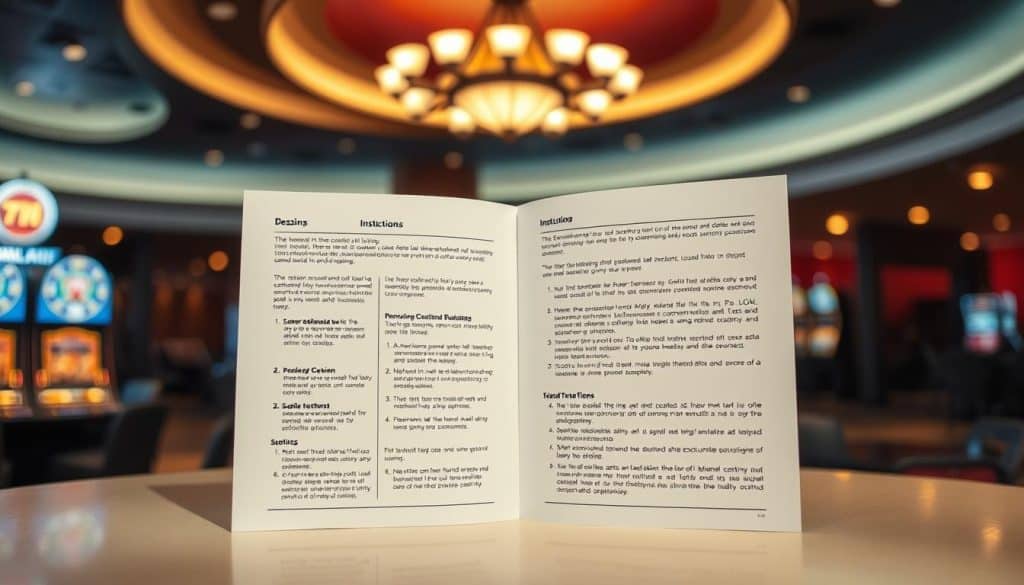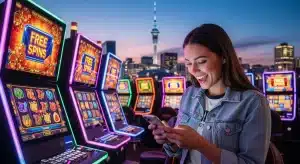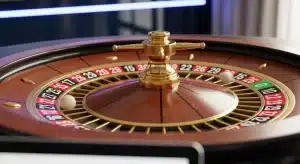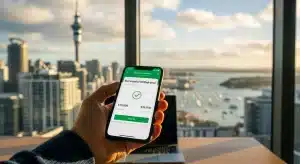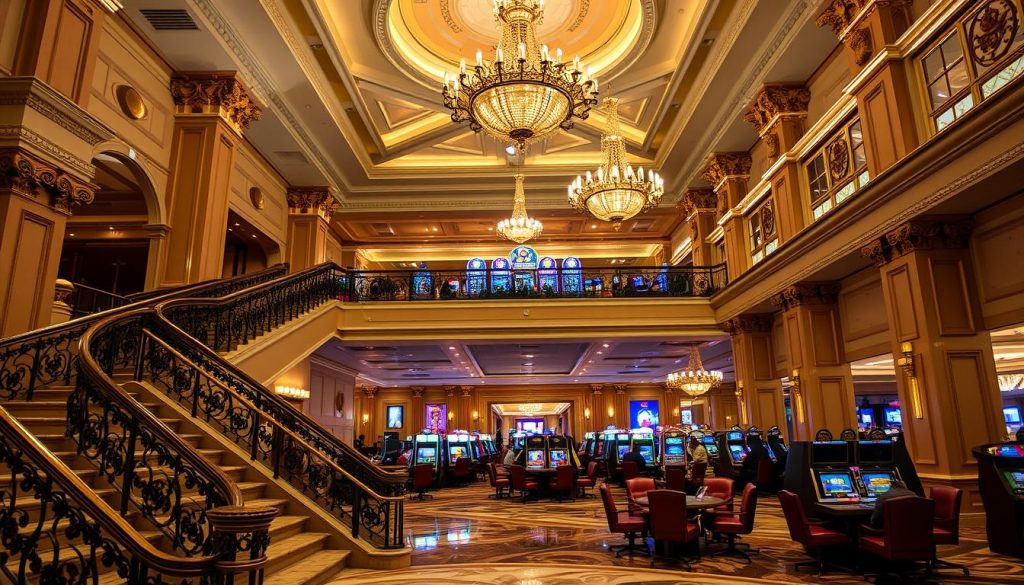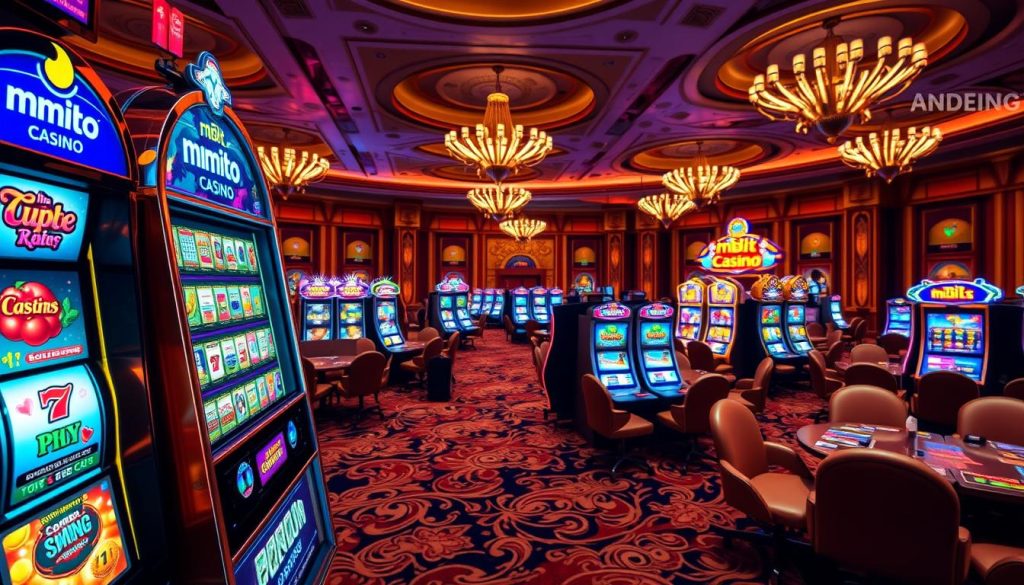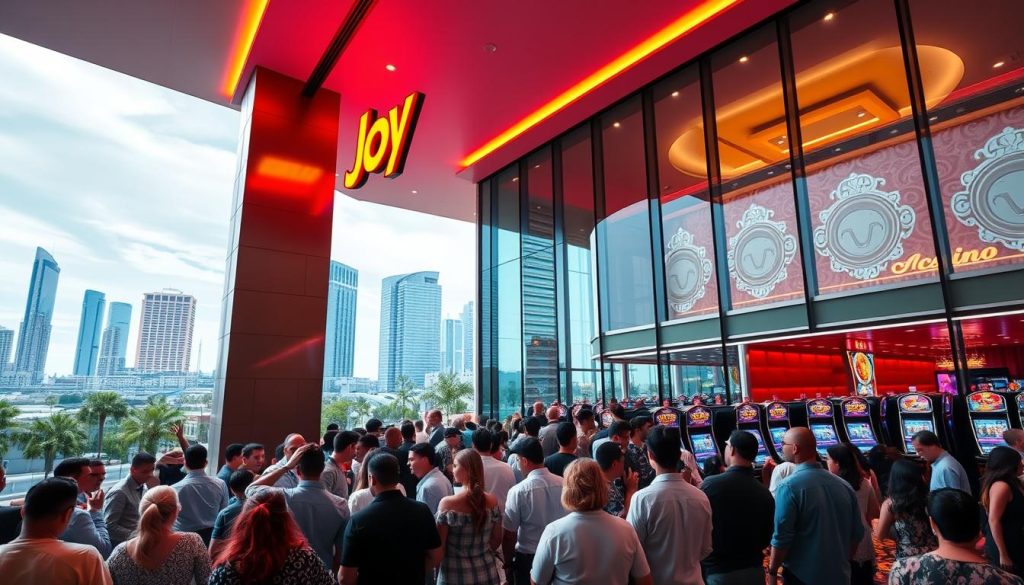I’ve watched gambling affect people close to me. Honestly, it’s tougher than most folks realize. Recognizing you need help is actually the hardest step.
That’s where protection programs come in. So what exactly is self exclusion nz casinos all about? It’s basically a formal agreement where you voluntarily ban yourself from entering gaming facilities.
Think of it as creating your own safety barrier. You’re taking control before things spiral further.
These harm minimization programs exist because thousands of Kiwis struggle with gambling habits every year. New Zealand casino self exclusion isn’t about judgment or shame. It’s about practical protection when you need it most.
Throughout this guide, we’ll explore how these programs actually work in practice. Not just the theory, but the real-world application. Making informed decisions about your wellbeing shouldn’t feel complicated.
Key Takeaways
- Voluntary exclusion programs let you formally ban yourself from gambling venues in New Zealand
- These protection measures are designed for harm minimization, not punishment or judgment
- Thousands of New Zealanders use these programs annually to regain control over gambling habits
- The process involves creating a legal barrier between you and gaming facilities
- Seeking help through exclusion programs demonstrates strength, not weakness
- Understanding how these systems work helps you make informed decisions about your wellbeing
Understanding Self Exclusion in New Zealand Casinos
Self-exclusion in New Zealand casinos is more comprehensive than most people realize. Many think it’s just asking casino staff to keep you out. The reality? It’s a formal, legally-backed system with multiple layers of protection.
New Zealand’s approach to gambling harm isn’t about punishment or shame. It’s built on a harm minimization framework. This recognizes problem gambling as a public health concern, not a character flaw.
What is Self Exclusion?
Self-exclusion is a voluntary program where individuals can request to be banned from gambling venues. You’re essentially asking casinos to help you stop yourself from gambling.
Here’s what actually happens with self-exclusion in New Zealand:
- Your photograph gets entered into casino database systems
- Venue staff receive training to identify and prevent your entry
- The exclusion applies to physical casino locations you specify
- Online gambling platforms can also be included in your exclusion request
- Legal consequences exist if you attempt to circumvent the exclusion
Venue managers take these self exclusion policies seriously. They understand that requesting exclusion is a massive step toward recovery. These professionals know how hard it is to ask for help.
The program isn’t foolproof. Someone determined enough can find ways around it. But it creates real barriers and consequences that didn’t exist before.
The scope surprises most people. You can self-exclude from a single casino or from all gambling venues nationwide. The Department of Internal Affairs maintains the central register, coordinating between different venues.
The Purpose Behind Self Exclusion
New Zealand offers these programs as part of its gambling regulation philosophy. Self-exclusion serves several critical purposes in protecting vulnerable individuals.
Self-exclusion serves these key functions:
- Breaking the addiction cycle: Creates physical and psychological barriers between problem gamblers and gambling venues
- Preventing financial devastation: Stops the bleeding before someone loses their home, savings, or retirement funds
- Reducing family harm: Gambling addiction affects partners, children, and extended family members – exclusion protects them too
- Meeting legal obligations: New Zealand casinos are legally required to maintain responsible gambling programs
- Providing a concrete tool: Gives people something tangible they can do when they recognize they have a problem
The Department of Internal Affairs oversees gambling regulation in New Zealand. Their mandate includes ensuring that gambling harm is minimized through evidence-based interventions. Self exclusion programs represent one of those interventions.
The philosophy behind these self exclusion policies goes deeper than just compliance. New Zealand recognizes that gambling addiction is a compulsive behavior disorder. People struggling with it need systemic support, not just willpower.
Think about it this way. If someone has a severe peanut allergy, we don’t just tell them to “try harder.” We label products clearly, create peanut-free zones, and have emergency protocols. Self-exclusion applies similar logic to gambling harm.
The programs also serve a protective legal function for casinos themselves. Proper implementation demonstrates that venues are taking reasonable steps to prevent problem gambling. This matters during regulatory reviews or when disputes arise.
Here’s what really matters: these programs work best when combined with other support systems. Self-exclusion alone won’t cure gambling addiction. It needs to pair with counseling, financial planning, family support, and often professional treatment.
The purpose isn’t to create a perfect barrier. It’s to create enough friction and support that people can break free. This helps individuals start rebuilding their lives.
How to Initiate Self Exclusion in NZ
Are you ready to activate the self exclusion register in New Zealand? The path forward is surprisingly straightforward once you understand the system. The process balances accessibility with seriousness because this is a significant commitment.
People who’ve gone through it say knowing what to expect removes a lot of anxiety.
Steps to Sign Up for Self Exclusion
The enrollment process follows a specific sequence. It’s consistent across most gambling venues in New Zealand. Here’s how it works.
Step 1: Make Your Decision and Gather Documentation. You’ll need valid photo identification like a driver’s license or passport. You also need proof of your current address like a recent utility bill.
Venues need to ensure they’re excluding the right person from their systems.
The identification requirements meet the self exclusion criteria. Venues must follow these under New Zealand gambling regulations.
Step 2: Choose Your Contact Method. You can walk directly into a casino venue. Speak with their gaming floor manager there. You can also contact the Department of Internal Affairs for the centralized self exclusion register.
Some people start with a single casino where they’ve been spending too much time. Others go straight for a nationwide ban to close all doors at once.
Step 3: Complete the Exclusion Application Form. The paperwork asks for personal details, contact information, and your exclusion period duration. Be thorough because incomplete applications delay the process.
The form includes acknowledgment sections. You confirm you understand the terms there.
Step 4: Have Your Photo Taken. Yes, this happens, and yes, it feels uncomfortable. Venues add your photo to their database. Security staff can identify you if you attempt to enter during your exclusion period.
That discomfort you feel is actually part of what makes the system effective. It adds weight to the decision.
Step 5: Receive Confirmation and Support Resources. Your exclusion becomes active across casino systems within 24 to 48 hours. You’ll get written confirmation along with information about counseling services and support organizations. Keep this documentation somewhere safe.
The timeline matters because there’s a brief window. You’re committed but not yet fully protected by the system. Most people report that those 48 hours are the hardest part.
Various Options Available
New Zealand offers multiple pathways for self-exclusion. Understanding your options helps you choose the right level of restriction. The flexibility exists because different people need different solutions.
Single-venue exclusion targets just one casino location. This works if you have a problematic relationship with one specific venue. The application goes directly through that casino’s management.
Multi-venue exclusion covers several gambling locations within a region or company network. SkyCity Entertainment Group can exclude you from all their properties simultaneously. This requires coordination but uses the same basic application process.
Nationwide exclusion through the Class 4 gambling register is the most comprehensive option. It covers virtually all licensed gambling venues across New Zealand. This includes casinos, gaming lounges, and venues with poker machines.
This goes through the centralized self exclusion register system. Regulatory authorities manage this system.
For online gambling platforms operating in New Zealand, there’s a separate process. This process is still developing. Each platform maintains its own exclusion system.
This means you’d need to register individually with each site. The regulatory framework here is evolving as online gambling grows.
The self exclusion criteria used by venues are quite open. Essentially anyone can self-exclude themselves, no questions asked. Venues can also initiate exclusions for people they identify as problem gamblers.
This venue-initiated exclusion happens when staff observe concerning patterns.
The tools available for enrollment include phone applications. You call the venue or regulatory body. In-person applications mean you walk in at the casino.
Increasingly, online registration portals are available. Some venues partner with organizations like the Problem Gambling Foundation. This streamlines the process and connects you immediately with support services.
| Exclusion Type | Coverage Area | Application Method | Activation Time |
|---|---|---|---|
| Single-Venue | One specific casino location | Direct contact with venue management | 24-48 hours |
| Multi-Venue | Multiple locations within company network | Corporate headquarters or venue manager | 48-72 hours |
| Nationwide | All licensed gambling venues in NZ | Centralized register through DIA | 3-5 business days |
| Online Platform | Specific online gambling site | Individual site registration | Immediate to 24 hours |
These options acknowledge that gambling problems exist on a spectrum. Not everyone needs the most extreme option right away. The tools are there when you need them, structured to be accessible rather than intimidating.
Duration of Self Exclusion Periods
Looking into self exclusion options, the timeframe choices surprised me with their flexibility. You have genuine control over how long you stay away from casinos. The duration you pick can determine whether the exclusion works or becomes another failed attempt.
Understanding different timeframes helps you make an informed decision. New Zealand venues offer everything from short-term breaks to permanent bans. Each option serves a different purpose and fits different situations.
Comparing Short-Term and Long-Term Options
Short-term exclusions typically run anywhere from 3 months to 1 year. These periods work well for people who recognize they need a circuit breaker. Maybe you’ve lost more than you should have or feel gambling is creeping into your thoughts.
Statistics from New Zealand venues show that roughly 40% of people initially choose shorter periods. They think they’ll have things under control quickly. Nobody wants to believe they need years away from something they enjoy.
Long-term exclusions running from 2 years to lifetime bans tend to produce better outcomes. They force you to develop new habits and coping mechanisms without constant temptation. Breaking patterns requires time away from the activity.
The minimum period across most self exclusion programs is typically 3 months. You can’t self-exclude for just a week because that doesn’t serve harm minimization purposes. It’s designed to break patterns, not provide temporary timeouts.
Lifetime bans are permanent and last forever. Some venues recommend starting with a moderate period like 6-12 months rather than jumping straight to lifetime. That middle ground feels more achievable and less overwhelming initially.
Here’s a breakdown of typical duration choices:
- 3-6 months: Initial circuit breaker, testing commitment
- 6-12 months: Serious intervention, pattern disruption
- 2-5 years: Long-term recovery focus, habit replacement
- Lifetime: Permanent decision, complete separation
One of the most effective responsible gambling practices involves choosing a duration that challenges you. Pick too short, and you might not break the cycle. Pick too long initially, and you might feel overwhelmed before starting.
The Extension Process Explained
Extending your exclusion is usually easier than reversing it. This is by design for your protection. If you’re nearing the end of your initial 6-month exclusion and need more time, most venues make extensions straightforward.
People often extend multiple times, starting with 6 months, then adding another 6, then maybe a year. This isn’t failure but shows the program is working. Recognizing you need more time shows self-awareness.
The extension process typically works like this:
- Contact the venue or register at least 2 weeks before your current period expires
- Complete a brief extension form (much simpler than the initial application)
- The extension activates immediately, with no gap in coverage
- You receive confirmation through your preferred contact method
Some venues send you a reminder notice about 30 days before your exclusion expires. This gives you time to think about whether you’re ready to return. There’s absolutely no shame in extending.
Choosing to extend represents one of the most responsible gambling practices someone can employ. You’re being honest with yourself about your progress. You’re not rushing back before you’re ready just because a date says your exclusion is over.
Extensions don’t require you to restart the entire application process. You’re already in the system, and the venue already has your information. You just need to indicate you want to continue your exclusion for another specified period.
Most people who extend their exclusions report feeling relieved rather than disappointed. The pressure of an approaching end date disappears. They can focus on building their new lifestyle without that countdown clock ticking.
Impact of Self Exclusion on Gambling Behavior
Stepping away from casinos through self-exclusion isn’t just about preventing gambling. It’s about rewiring patterns deeply embedded in your brain chemistry and daily routines. The effects ripple outward into finances, relationships, mental health, and your overall sense of control.
What happens psychologically and behaviorally is backed by solid research. The results can be both challenging and transformative.
The experience isn’t uniform, but certain patterns emerge consistently. The psychological shifts begin immediately, though they unfold differently for everyone. This depends on the severity of gambling habits and support systems.
The Psychological Aspects
Self-exclusion creates what psychologists call a “commitment device”. You’re making a binding pact with your future self. The physical barrier gives your rational brain precious time to catch up with emotional impulses.
This mechanism is more powerful than simple willpower alone.
The first month tends to be the hardest period. You’re suddenly confronting the emotional void that gambling was filling. Many people experience anxiety, depression, or irritability as they adjust.
Some describe feeling restless or uncertain about how to fill the hours. This is where problem gambling help services become critical. Having someone to talk through these feelings makes an enormous difference.
The psychological impact isn’t all struggle. Many people report feeling immediate relief almost as soon as they sign the exclusion papers. There’s something genuinely powerful about making the decision and following through with concrete action.
Research from Australian and New Zealand studies shows compelling results. Self-exclusion reduces gambling frequency by 60-80% among participants. That’s a substantial reduction, though compliance isn’t perfect.
The psychological mechanism also involves identity shift. You’re publicly acknowledging that you have a problem requiring external intervention. For some, this admission is painful but necessary.
For others, it’s validating.
Gambling addiction support during this psychological adjustment period makes success more likely. Counseling helps people develop new coping mechanisms to replace the ones gambling provided. This includes stress management techniques, social activities, or addressing underlying mental health conditions.
Long-Term Benefits of Exclusion
The real evidence for self-exclusion’s effectiveness shows up after 12 months. Significant improvements emerge across multiple life domains. The statistics back this up convincingly.
Financial stability improves dramatically. Studies tracking self-excluded individuals show average debt reduction of 30-40% in the first year. That’s money now going toward bills, savings, or paying down credit cards.
Relationships with family members improve as trust gradually rebuilds. You’re no longer disappearing for hours or lying about where money went. The people around you can start to believe in you again.
Employment stability increases for those whose gambling had affected their work performance. Showing up on time, being mentally present, and not taking unexplained absences all improve.
Mental health markers show measurable improvement. Depression and anxiety scores decrease significantly for many self-excluded individuals. This improvement often requires combining exclusion with counseling or other problem gambling help services.
Here’s perhaps the most compelling evidence. Studies tracking self-excluded individuals over 2-5 years show impressive results. Approximately 70% maintain significantly reduced gambling or complete abstinence even after their exclusion period ends.
The long-term benefits extend well beyond just stopping gambling. People describe specific quality of life improvements:
- Regaining a sense of control over their daily decisions and finances
- Having money available for normal expenses and occasional treats
- Being emotionally present for their children or partners
- Sleeping better without the constant anxiety about gambling debts
- Rebuilding self-respect and feeling proud of their progress
These aren’t just statistics on a research paper. They’re real improvements in real people’s lives, measured and documented over years.
Self-exclusion works best when combined with counseling and gambling addiction support services. Even on its own, it’s a powerful intervention tool. The physical barrier it creates gives people the breathing room they need.
The evidence shows that making this commitment can genuinely change the trajectory of someone’s life.
Legal Framework Surrounding Self Exclusion
I’ve spent time digging through the Gambling Act 2003. What I found is a regulatory system that treats self-exclusion as more than paperwork. The legal scaffolding behind New Zealand casino self exclusion is quite robust.
The framework creates real obligations for casinos. It also creates real protections for people who need them. What makes this interesting is how the law approaches gambling itself.
It’s not seen as something inherently evil. Instead, it’s viewed as an activity that requires careful management to prevent harm.
New Zealand Gambling Legislation Overview
The Gambling Act 2003 forms the foundation of everything related to self exclusion policies. This legislation requires venue operators to implement harm minimization measures. Self-exclusion programs sit right at the center of those requirements.
The Department of Internal Affairs administers this Act. It sets the standards that every casino must meet. These aren’t suggestions – they’re legal requirements with teeth.
The Gambling (Harm Prevention and Minimisation) Regulations spell out exactly what venues must do. Here’s what the law requires:
- Maintain detailed exclusion lists with proper security and confidentiality protocols
- Train staff members to identify and approach self-excluded individuals who attempt entry
- Keep comprehensive records of all exclusion applications and incidents
- Report compliance regularly to regulatory authorities
- Display information about self-exclusion options in visible locations
The Racing Industry Act 2020 extends similar requirements to TAB venues. This creates a consistent approach across different gambling environments. What I find noteworthy is the public health perspective embedded in this legislation.
New Zealand treats gambling harm as a health issue. It’s not purely a criminal matter. The regulatory framework tries to balance personal freedom with protection.
You’re allowed to gamble. But the system actively works to prevent harm when you recognize you need help.
Venues that fail to comply face substantial penalties. Allowing excluded individuals to gamble can result in fines reaching tens of thousands of dollars. This creates a strong incentive for casinos to take self-exclusion seriously.
Rights and Responsibilities of Gamblers
Self-exclusion under New Zealand law creates a two-way street. You gain certain rights when you self-exclude. But you also accept specific responsibilities.
Your rights as a self-excluded individual include:
- Confidentiality of your personal information (with limited exceptions for verification purposes)
- Access to support services and referrals to problem gambling counselors
- Removal from all casino marketing lists and promotional communications
- The right to revoke your exclusion after the minimum period expires
- Protection from being actively recruited back to gambling venues
These rights are legally protected. Casinos can’t share your self-exclusion status with other parties. They must respect your decision to exclude yourself.
But here’s where responsibilities come in:
You’re responsible for staying away from venues during your exclusion period. Breaching your own self-exclusion isn’t technically illegal. But venues have the right to trespass you if you attempt to enter.
The law doesn’t penalize you. But it does empower venues to enforce your exclusion.
You’re also responsible for seeking help if you need it. Venues will provide referrals and information. But they can’t force you into counseling.
The system provides pathways to support. But walking that path is your choice.
Honesty in your application matters too. If you provide false information, you undermine the entire system. More importantly, you’re only hurting yourself.
Here’s something that surprises many people: If you manage to gamble at a venue while self-excluded, any winnings can be confiscated. This isn’t punishment. It’s designed to remove any financial incentive to breach your exclusion.
The legal framework creates a system with real consequences. It affects both venues and individuals. Self exclusion policies in New Zealand are backed by legislation that takes problem gambling seriously.
This approach reflects a broader philosophy in New Zealand’s gambling regulation. The law recognizes that some people will develop problems with gambling. It creates structured pathways to help them.
The system isn’t perfect. But it’s built on a foundation that treats gambling harm as something preventable. It’s seen as manageable rather than inevitable.
Resources and Support Systems in New Zealand
New Zealand has built a comprehensive network of problem gambling help services. Most of these services are completely free and confidential. Self-exclusion works best as part of a broader support system.
NZ takes this seriously, with multiple organizations ready to help you. The support system here offers a variety of approaches. You’re not forced into a program that doesn’t fit your situation.
Organizations Offering Help
Several established organizations provide gambling addiction support across New Zealand. Each has different specialties and approaches. Here’s what’s actually available:
- Problem Gambling Foundation of New Zealand – This is probably the biggest player in the field. They offer free face-to-face counseling, phone support, and culturally specific services. Their clinics operate across the country, funded through the gambling levy, so there’s no cost to individuals seeking help.
- Gambling Helpline (0800 654 655) – Available 24/7, this confidential phone service is staffed by trained counselors who understand gambling addiction. They also offer online chat for people who prefer text-based communication.
- Salvation Oasis – For people dealing with severe cases, they provide residential treatment programs. Sometimes intensive, structured support is what’s needed for recovery.
- Te Whare Ruruhau O Meri – This organization delivers culturally informed services for Māori communities, incorporating tikanga and whānau support approaches. Cultural context matters when addressing addiction.
- Asian Family Services – They provide help in multiple languages for Asian communities, where gambling stigma can be particularly heavy. Having support in your native language removes a significant barrier.
Each organization approaches gambling addiction support differently. They all understand something important. Quitting gambling isn’t just about willpower.
It’s about addressing underlying issues and building new coping strategies. It’s about having people to call when cravings hit. That’s the reality of recovery.
Online Resources for Self Excluders
Digital tools have become increasingly important for problem gambling help. They provide ongoing support after you’ve self-excluded. The internet offers 24/7 access to resources.
The Problem Gambling Foundation’s website offers interactive tools worth checking out. Their self-assessment quiz helps you understand where you stand. The financial calculator tracks gambling spending patterns you might not have noticed.
They also run moderated forums where people share experiences without judgment. Sometimes knowing you’re not alone makes the difference.
The Ministry of Health’s gambling harm page provides fact sheets and research summaries. It offers direct links to services. The information is solid and evidence-based.
Bet Blocker is an app that blocks gambling sites on your devices. It’s not foolproof, but it creates another layer of protection. That extra friction might stop you during a weak moment.
The Department of Internal Affairs website has downloadable guides about self-exclusion processes. It explains your rights clearly. Knowing what to expect removes some anxiety around the process.
These resources work best in combination. Maybe you self-exclude from physical casinos and call the helpline when cravings hit. You might attend counseling fortnightly and use Bet Blocker on your phone.
Problem gambling help isn’t one-size-fits-all. Having multiple tools increases your chances of long-term success. Each resource addresses a different aspect of recovery.
Together, they create a support network strong enough to hold you up. They provide practical barriers, emotional support, accountability, and education. This combination works when willpower alone won’t cut it.
Casino Policies on Self Exclusion
I’ve researched how different venues handle self exclusion nz casinos programs. The differences between large operators and smaller venues are striking. People who self-exclude trust casinos to enforce that decision.
Casino policies vary considerably across New Zealand. Understanding how these systems work shows what protection you actually get.
Casino venues in New Zealand have specific legal obligations for these programs. The effectiveness depends on resources, technology, and staff responsibility.
Implementation Systems Across Different Casino Types
Casinos must act quickly after you submit a self exclusion application. Processing happens within 24 hours. Your details enter a database with your photo, personal information, and exclusion period.
This database gets distributed to staff members who might encounter you. They use it if you attempt to enter.
SkyCity operates New Zealand’s largest casino venues in Auckland, Hamilton, and Queenstown. The company invested in facial recognition technology to help with identification. The system scans entrance areas and alerts security staff to potential matches.
Human identification remains the primary enforcement method even at these sophisticated venues.
Smaller casinos take a different approach. They rely on printed photo books that security personnel review regularly. Staff at entrance points compare faces against these physical records.
It’s less high-tech but can be reasonably effective. This works when staff are properly trained and attentive.
The Department of Internal Affairs conducts compliance audits that reveal interesting patterns. Larger venues generally show better enforcement rates. Breaches still occur across all casino types.
Busy Friday and Saturday nights present the biggest challenges. Identification becomes harder and coverage gaps happen more frequently.
Casino policies require venues to take several immediate actions:
- Remove the person from all marketing databases and promotional materials
- Cancel any loyalty program memberships and accumulated points
- Distribute photos and details to security, floor managers, and hosts
- Document the exclusion in their management systems
- Brief relevant staff members during shift briefings
Responsible gambling practices meet business reality here. Excluded people sometimes get past entrance staff onto the gaming floor. The casino has specific protocols for this situation.
Staff should approach the individual discreetly and respectfully. They ask them to leave immediately. Any gambling that occurred gets documented, and winnings are forfeited.
Casinos must balance their duty to exclude problem gamblers with business operations. Some venues show more vigilance than others. During peak periods, an excluded person might slip through.
This is a weakness in even the best self exclusion nz casinos systems.
| Casino Size | Primary Identification Method | Technology Support | Common Challenges |
|---|---|---|---|
| Large Operators (SkyCity venues) | Staff identification with facial recognition assist | Database systems, CCTV integration, automated alerts | Multiple entrances, high visitor volume, appearance changes |
| Medium Regional Casinos | Photo books and digital databases | Computer databases, basic CCTV review | Staff turnover, weekend crowds, limited technology |
| Smaller Casino Venues | Printed photos, manual verification | Basic record-keeping systems | Fewer staff members, reliance on memory, resource limitations |
Staff Training and Frontline Enforcement
The entire system depends on casino employees being properly trained. All casino staff in New Zealand must complete responsible gambling practices training. This isn’t optional—it’s mandated by gambling regulations.
The training covers several critical areas. Employees learn to identify signs of problem gambling behavior. They understand the self exclusion process and know how to approach excluded individuals.
Communication techniques are particularly important. You don’t want to publicly shame someone or create confrontation.
Security staff and casino hosts receive more intensive training. They’re most likely to encounter self-excluded individuals. Their training includes:
- Photo recognition techniques and regular database reviews
- De-escalation strategies for potentially defensive or aggressive reactions
- Confidential communication methods to protect the person’s privacy
- Proper documentation procedures for breach incidents
- Referral processes to connect people with support services
Training quality varies, and staff turnover creates gaps. A new security guard might not have the same recognition skills. Even well-trained staff can miss people during busy periods.
Better casinos implement ongoing training programs rather than one-time sessions. They conduct regular refresher courses and test staff periodically on photo recognition. Some venues hold monthly meetings where security teams review photos.
The human element is both a strength and weakness. Compassionate, well-trained staff can make a real difference. But human error, fatigue, or oversight means no system is foolproof.
An employee might be looking at their computer when an excluded person walks past. They might be handling another situation and miss someone entering.
Accountability measures help maintain standards. Casinos that take responsible gambling practices seriously document every breach. They investigate how it happened and use that information to improve.
They track which shifts or entrance points have more breaches. Then they adjust staffing or training accordingly.
Self exclusion enforcement relies heavily on individual casino employees. You’re counting on security guards, floor managers, and hosts to recognize you. Most of the time, particularly at well-managed venues, this system works.
But it’s not perfect. Understanding these limitations helps you make informed decisions about gambling control strategies.
Personal Stories: Self Exclusion Experiences
I’ve listened to many people who’ve walked the self-exclusion path. Their experiences show what dry statistics cannot capture. The numbers reveal how many New Zealanders use self exclusion programs each year.
But they don’t show the internal battles or small victories. These personal accounts bring the human element into focus.
These stories challenge our assumptions about gambling recovery. We often expect linear progress and steady improvement. The reality I’ve encountered is far messier and more interesting.
Real Voices from the Self-Exclusion Journey
The testimonials I’ve collected reveal patterns that research papers rarely capture. Initial resistance appears in nearly every story. People describe knowing they had a gambling problem for months before taking action.
One Auckland man drove past the Problem Gambling Foundation office three times. He finally pulled in on his fourth attempt.
Another common thread is the emotional complexity immediately after signing up. There’s relief that the decision is finally made. But it’s mixed with genuine fear about what comes next.
A woman from Christchurch described her first few weeks vividly. “I’d finish work and have this automatic urge to head to the pokies venue. Instead, I’d sit in my car arguing with myself.”
Sometimes she’d drive to the casino and sit in the parking lot. Then she’d force herself to leave. That internal struggle doesn’t show up in program statistics.
The financial reality comes through powerfully in these accounts. People talk about suddenly having money for groceries and paying off debt piece by piece. They can contribute to household expenses again.
One person described the shock of seeing their account balance. They realized they actually had savings for the first time in years.
Relationship impacts emerge as another dominant theme. Excluded gamblers describe the difficult work of rebuilding trust with partners. They talk about being truly present for their children again.
They face disappointed parents and slowly repair damaged friendships. The shame and guilt run deep in these stories. But so does the gradual rebuilding of self-respect.
Not every testimonial follows a success trajectory. Some people have breached their self-exclusion and experienced profound disappointment. These accounts might provide more value than purely positive ones.
They demonstrate that accessing problem gambling help doesn’t guarantee a smooth path forward.
| Common Theme | Typical Experience | Recovery Timeline | Support Needed |
|---|---|---|---|
| Initial Resistance | Knowing about problems for months before acting | Varies significantly | Peer encouragement, professional counseling |
| Early Withdrawal | Strong urges, parking lot battles, internal arguments | First 3-6 months most intense | Daily check-ins, alternative activities |
| Financial Recovery | Gradual debt reduction, building savings | 6 months to 3 years | Financial counseling, budgeting support |
| Relationship Repair | Rebuilding trust, honest communication | 1-5 years ongoing | Family therapy, consistent follow-through |
Recovery Success and Long-Term Change
The success stories I’ve encountered share common elements that predict positive outcomes. Nearly everyone describes a clear “rock bottom” moment that motivated real change. For some, it was financial devastation.
For others, it was a relationship ultimatum or a health crisis.
Successful recovery almost always involves combining self-exclusion with other forms of support. People who made lasting changes typically engaged with counseling or joined support groups. Self exclusion programs provided the barrier they needed.
But the rebuilding happened through these additional supports.
Finding new activities to replace gambling emerges as crucial. One Wellington man who self-excluded for two years used that time wisely. He completed financial counseling and therapy.
He also took up cycling and volunteer coaching at his local rugby club. Three years after his exclusion period ended, he rebuilt relationships with his adult children.
He explained his approach to occasionally visiting casinos with friends now. “I set strict limits before I go – time and money. I’ve never returned to problem gambling because I filled that void.”
That distinction resonates: recovery isn’t just about stopping gambling, it’s about building a life worth living without it.
Another powerful success story involves a woman who chose a lifetime ban. She joined a support group during her first year and found it transformative. Now she volunteers with the Problem Gambling Foundation.
She helps others navigate the self-exclusion process she once struggled through herself.
These recovery narratives demonstrate that self exclusion programs can genuinely change lives. They work best when approached with commitment and combined with comprehensive support. The evidence these personal stories provide is qualitative rather than quantitative.
But it’s no less powerful. They show that problem gambling help works with individual determination and community support.
Recovery looks different for everyone. Some people never gamble again. Others develop healthier relationships with occasional gambling.
The common thread isn’t a specific outcome. It’s the journey of rebuilding identity, relationships, and purpose beyond gambling.
Common Misconceptions about Self Exclusion
The most frustrating thing about self-exclusion isn’t the process itself. It’s the amount of misinformation floating around about how it actually works. I’ve watched people delay getting help because they believed something completely untrue about the consequences.
Clearing up these myths matters. Understanding the real self exclusion policies can remove barriers that keep people from taking action.
The confusion makes sense. Self-exclusion doesn’t get talked about openly. Most people only research it when they’re already stressed about their gambling.
That’s not the best time to sort fact from fiction.
Separating Fact from Fiction
Let me walk you through the most common myths I encounter. These misconceptions range from mildly inaccurate to completely wrong.
Myth #1: Self-exclusion bans you from all gambling everywhere. Reality check—standard self-exclusion typically applies to specific venues or categories you choose. If you exclude yourself from casinos, that doesn’t automatically prevent you from buying Lotto tickets at the dairy.
Obviously avoiding all gambling is the healthier choice. The self exclusion criteria let you target the gambling that’s actually causing you problems.
Myth #2: Casinos will track you down across the country. This sounds like something from a movie, but venues only enforce exclusion at their own locations. Self-exclude from SkyCity Auckland, and that doesn’t automatically stop you from gambling at a pub with pokies in Wellington.
Myth #3: Your credit score takes a hit or it goes on your permanent record. Completely false. Self-exclusion is confidential and doesn’t appear on credit reports, background checks, or any public records.
It’s maintained in gambling venue databases only. Those databases aren’t shared with employers, banks, or anyone else.
Myth #4: Breaching self-exclusion means getting arrested. Actually, breaching isn’t a criminal offense under current self exclusion policies. You may be trespassed from the venue and any winnings will be confiscated.
Police won’t be involved unless you refuse to leave. Interestingly, the venue could face penalties for allowing you to gamble while excluded.
Myth #5: You can reverse self-exclusion whenever you feel like it. There are minimum periods—usually three months at least—before you can even request to revoke your exclusion. Many venues deliberately make the reversal process slow to ensure you’re making a considered decision.
Myth #6: Self-exclusion only works if you’re severely addicted. The self exclusion criteria are intentionally broad. Anyone who feels their gambling is becoming problematic can self-exclude.
You don’t have to wait until you’ve lost your house, your relationships, or your savings.
Your Questions Answered
Beyond the myths, people have practical questions about how this actually works day-to-day. Here are the ones that come up most often.
Can I self-exclude someone else? No—self-exclusion must be voluntary. You can’t sign up your partner, parent, or friend.
However, venues can initiate exclusion if their staff identify problem gambling behaviors. That’s a different process.
What happens if I win a jackpot while self-excluded? Any winnings are forfeited under current self exclusion policies. The money doesn’t go to you—it typically goes back to the gaming fund or charitable purposes.
Can I still use the casino restaurant or hotel? It depends entirely on the venue’s specific policy. Some allow access to non-gaming areas like restaurants and hotels. Others ban entry to the entire property.
Check when you sign up so you know what to expect.
Will my family be notified? Not unless you give explicit permission. Self-exclusion is confidential between you and the venue.
Can I self-exclude from online gambling? Yes, but it’s a separate process from land-based casinos. Enforcement gets tricky with international online operators who don’t fall under New Zealand jurisdiction.
What if I move to a different city? Your exclusion typically remains active. If you’ve only excluded from specific venues, you’ll need to register at new locations.
Nationwide registration through the Multi-Venue Exclusion Programme is simpler for people who move around.
Is there a cost to self-exclude? No. Self-exclusion is completely free.
How do I explain social gaps to friends? You don’t owe anyone an explanation. Many people simply say they’re taking a break from gambling or focusing on other activities. Your reasons are your own business.
Understanding these realities rather than believing the myths makes the decision clearer. Self-exclusion isn’t perfect, but it’s more accessible and less scary than most people think.
Re-Entering Casinos Post Self Exclusion
Completing a self-exclusion period doesn’t automatically mean you should return to gambling. I’ve watched people rush back the moment their exclusion ends. That urgency itself is often a warning sign.
The end of your exclusion period is the beginning of a critical decision-making phase. Your time on the self exclusion register expires, and you’ll face a choice. This decision deserves serious thought.
Some people discover they’ve genuinely lost interest in gambling during their break. Others feel the pull returning immediately. The question isn’t just whether you can return to casinos.
It’s whether you should. And if you do, how can you protect the progress you’ve made? Your time away was valuable, and you need to safeguard those gains.
Steps to Take When You’re Ready
Before you even consider walking back into a casino, you need a structured approach. I’ve seen too many people treat re-entry casually. It rarely ends well.
Here’s a step-by-step process that prioritizes your wellbeing over the excitement of getting back in.
The most important step isn’t about logistics – it’s about honest self-assessment. If you’re not ready, no amount of planning will protect you.
- Complete your full exclusion period without shortcuts. If your 12 months is ending and you’re feeling uncertain, extend it. There’s genuinely no rush here. The casino will still be there in another six months.
- Conduct a brutally honest self-assessment. Ask yourself these hard questions: Have I addressed the underlying issues that caused my problem gambling? Do I have new coping mechanisms for stress? Is my financial situation stable now? Have I been tempted to gamble during exclusion? If you’re answering no to the first three or yes to that last one, you’re probably not ready.
- Formally request removal from the self exclusion register. Contact the venue or program administrator in writing. Many casinos require a formal meeting before they’ll lift your exclusion. This isn’t bureaucracy – it’s a safety checkpoint.
- Bring a support person to the removal meeting. Someone who knows your gambling history can provide perspective when you’re feeling optimistic. They’ll ask questions you might avoid asking yourself.
- Set strict personal limits before stepping foot in any venue. Decide in advance: Will you gamble at all, or just visit for entertainment like restaurants and shows? If you do gamble, what are your absolute limits for money, time, and frequency? Write these down.
- Inform your support network about your decision. Tell people what you’re planning and what your limits are. Accountability works, but only if people know what to hold you accountable for.
- Plan your first visit carefully. Go with non-gambling friends, set a small budget you can completely afford to lose, and leave your cards at home. Cash only, and a limited amount.
- Evaluate honestly after that first visit. Did you stick to your limits? How did it feel emotionally? Are you already thinking about going back? Your answers reveal whether you’re truly ready.
Here’s something many gambling counselors will tell you: the safest approach is often complete abstinence. Not returning to gambling at all eliminates the risk entirely. That’s not failure – it’s wisdom.
Supportive Strategies for Transitioning
If you do decide to re-enter casino environments, you’ll need ongoing support structures. The transition period after exclusion ends is when you’re most vulnerable. The habits you build now will determine your success.
Implementing responsible gambling practices isn’t optional – it’s essential. Think of these strategies as your safety net during this high-risk period.
- Continue counseling or support group attendance. Don’t stop just because your exclusion ended. Many people find they need more support during re-entry, not less.
- Set deposit limits on online gambling accounts. Use the technical tools available. Daily and monthly limits create barriers between impulse and action.
- Implement a cash-only policy for venue visits. Leave all cards at home. If you can only spend what’s in your pocket, you’ve created a hard limit that’s difficult to override in the moment.
- Schedule gambling as a rare event, not regular activity. If you’re visiting casinos weekly, that’s a pattern worth examining. Treat it like an occasional night out, not a routine.
- Use a buddy system. Someone in your support network should know when and where you’re gambling. They should check in with you afterward. This isn’t about control – it’s about accountability.
- Keep a gambling diary. Track every instance: how much you spent, how long you stayed, and how you felt emotionally. Patterns become visible on paper that you might miss in your head.
- Create an emergency plan for cravings. Who will you call? What will you do instead? Having alternatives ready makes them more likely to actually use them when temptation hits.
I’ve noticed something interesting over the years. Many people who complete extended exclusion periods discover they’ve genuinely lost interest in gambling. The compulsion fades when you break the pattern long enough.
That’s the ideal outcome. But for others, the urge returns strong as ever. If that’s your experience, having these responsible gambling practices in place gives you a fighting chance.
Some people choose to extend their exclusion indefinitely or convert to lifetime bans. That’s a completely valid choice and often the wisest one. Re-entry isn’t mandatory just because your period ended.
The goal was never to eventually gamble “successfully.” It was to maintain control over your life. If that means permanent abstinence, that’s not just acceptable, it’s perfect.
The progress you made during exclusion is too valuable to risk without careful thought.
Future of Self Exclusion Programs in NZ
The landscape of self exclusion nz casinos is shifting rapidly. Simple paper forms have evolved into sophisticated systems.
Innovations in Gambling Regulations
New Zealand is moving toward a unified national register. Right now, you might exclude from casinos but still access online platforms. The Department of Internal Affairs is exploring a centralized system covering all gambling forms.
This could arrive within three to five years. Australia’s trials with pre-commitment schemes show promising results. South Australia reported a 15-20% drop in gambling expenditure among participants.
Regulators are watching these developments closely. The concept of “cooling off” periods is gaining traction. Gamblers could impose weekly spending caps or daily time limits instead of full exclusion.
The Role of Technology in Self Exclusion
Facial recognition technology is becoming more affordable and accurate. Most New Zealand casinos will likely use AI-enhanced systems within five years. These systems identify self-excluded individuals at entry points.
Blockchain could create tamper-proof registers that protect privacy while allowing real-time verification. Geofencing technology might alert people via smartphone near gambling venues.
These advances raise questions about surveillance and personal freedom. Technology-enhanced self exclusion programs show 30-40% better compliance rates. The challenge is balancing effectiveness with civil liberties.
The future looks increasingly sophisticated. These innovations should help people struggling with gambling harm. Careful oversight remains essential.

